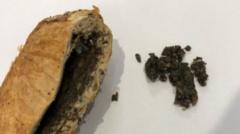In a gripping legal saga that has captivated Australia and beyond, Erin Patterson has been found guilty of the murder of three family members following a fatal meal of beef Wellington laced with deadly mushrooms. The Supreme Court of Victoria presented damning evidence, including over 100 images taken during the investigation, showcasing both the toxic mushrooms and the leftovers from the meal consumed on July 29, 2023.
Patterson, 50, was convicted of murdering her former in-laws, Don and Gail Patterson, both 70, and Gail's sister, Heather Wilkinson, 66. A fourth victim, Ian Wilkinson, Heather's husband, managed to survive but required extensive hospitalization. Notably, Patterson's estranged husband opted out of the meal at the last minute, citing discomfort amid ongoing tensions.
The prosecution argued that Patterson intentionally sought out death cap mushrooms—one of the most lethal fungi known to humanity—aiming to poison her relatives. Following the guilty verdict, the court released a series of photographs illustrating critical evidence, including the collected beef Wellington leftovers, which were bagged for forensic testing to avoid contamination.
Death cap mushrooms are notoriously dangerous, responsible for the majority of fatal mushroom poisonings worldwide. Their identification is complicated due to their varied appearance, which can range from greenish-yellow to brown. Evidence revealed that Patterson had searched online for sightings of these deadly fungi and had recently purchased a food dehydrator. Despite her claims of purchasing dried mushrooms from a Melbourne grocery store, conflicting evidence, including her mobile search history and location data, indicated her involvement with the mushrooms closer to home.
Forensic examination of a discarded food dehydrator led authorities to uncover traces of the deadly mushrooms, as well as fingerprints linked to Patterson. Days after the incident, Patterson reportedly attempted to dispose of the dehydrator while professing ignorance of owning such a device, a claim contradicted by contradictory evidence found in her home.
The case has sparked significant discussions not only about culinary safety but also about forensics and the responsibilities surrounding mushroom consumption. Authorities continue to advocate for public awareness regarding the potential risks associated with wild mushrooms, underscoring the necessity of proper identification before consumption.



















